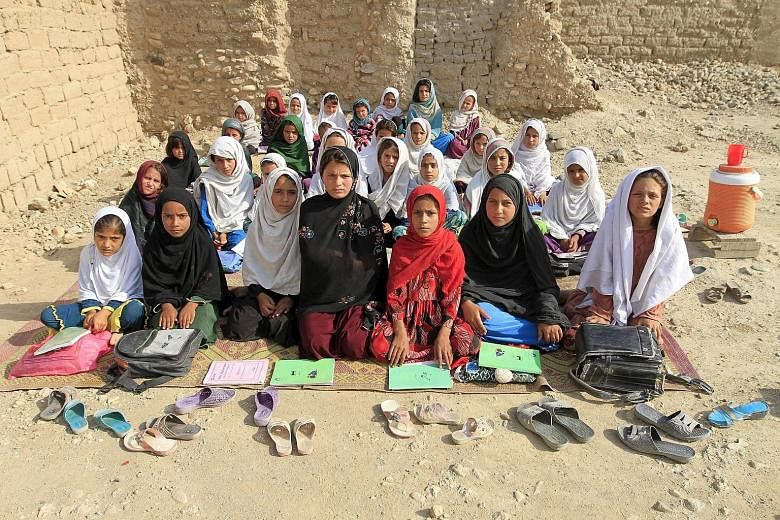LONDON • When the Taleban banned girls' education in Afghanistan, six-year-old Shabana Basij- Rasikh started dressing as a boy and for five years risked her life to attend a secret school.
Today, 14 years on, she runs Afghanistan's only boarding school for girls, aiming to foster a new generation of leaders across professions who can help create a strong country following decades of war.
"It's especially important to educate young girls in Afghanistan because we have not tapped into half of society,"says Ms Basij-Rasikh. "We're talking about a phenomenal opportunity for Afghanistan."
-
GENDER GAP IN EDUCATION
-
Just over half of girls in urban areas attend school, but only 28 per cent in rural areas.
Afghanistan has the world's highest level of gender disparity in primary education, with 70 girls in school for every 100 boys. There are only 55 girls per 100 boys at secondary level and 33 at tertiary.
In rural areas, only 4 per cent of the poorest girls complete primary school.
Despite millions of girls entering school since the Taleban's fall, many still miss out because of a huge shortage of female teachers, says Ms Basij-Rasikh, now 25, who has won international acclaim for her work championing girls' education. The gender gap in primary schools remains the largest globally, with only seven girls for every 10 boys, falling to 5.5 girls at secondary level.
Ms Basij-Rasikh, a speaker yesterday at the Trust Women conference on women's rights and trafficking run by the Thomson Reuters Foundation, said she was lucky to grow up in a family where daughters were prized. Her grandfather insisted Ms Basij-Rasikh's mother go to school even though his father disowned him for doing so. Ms Basij-Rasikh's father - an army general who was the first boy in his family to be schooled - was also adamant his daughters should be educated, even when the Taleban took power in 1996.
"My parents knew they were risking our lives in sending us to a secret school," she said. "But it was a lot harder for them to imagine their daughters growing up uneducated. For them, that would have been a major step backwards."
Ms Basij-Rasikh and her older sister - dressed in a burqa - would vary their route to school every day to avoid arousing suspicions, hiding their books in grocery bags. They had several "terrifying close calls".
"Afterwards, we'd beg our parents to let us stay at home like all the other girls we knew," she said. "But my father would always say, 'Look, you can lose everything in life, but there is one thing that nobody can take away from you, and that's your education'."
After the Taleban fell in 2001, Ms Basij-Rasikh attended a public school before going to college in the United States. While there, she co-founded the School of Leadership, Afghanistan (Sola), with the aim of giving young Afghans access to an education abroad and jobs back home. In 2012, she turned Sola - which means "peace" in the Pashto language - into the country's first girls' boarding school to educate girls from across the country.
Sola has 25 students and has helped 45 girls study in the US, Canada, Britain, Jordan, Kyrgyzstan and Bangladesh, with scholarships amounting to US$9.5 million (S$13.5 million). Some hope to be doctors, others want to become the country's first female president. One dreams of becoming an astronaut.
"Most of them are the first girl in their family to receive an education. It's a huge change," said Ms Basij-Rasikh, who plans to expand the school to 340 students in seven years and wants to see more female teachers. In conservative communities, this can make the difference between a girl going to school or staying at home, she said, yet less than a third of teachers are women.
REUTERS

